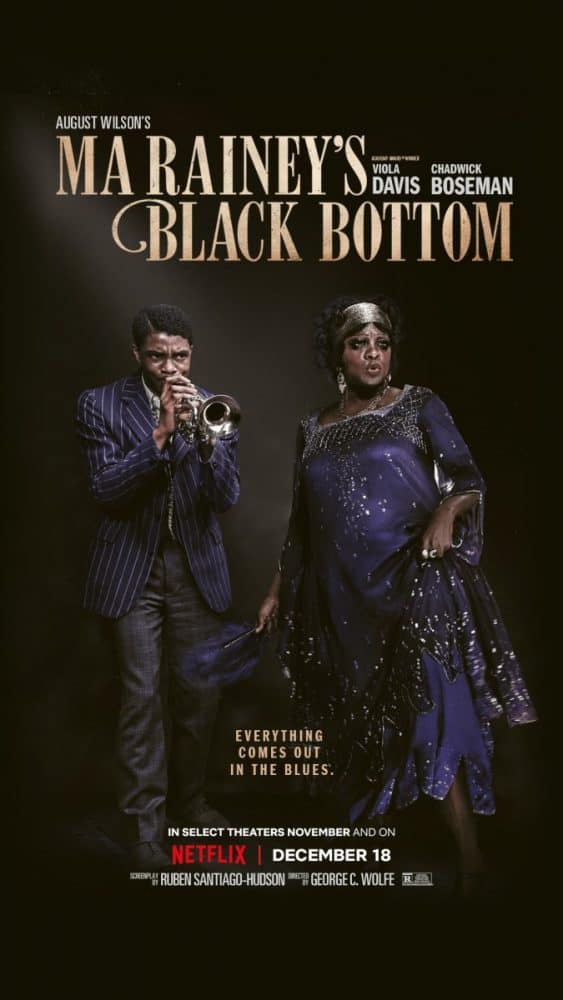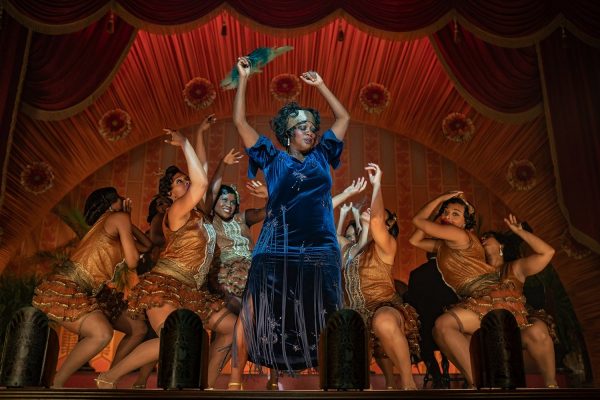Ma Rainey’s Black Bottom, 2020.
Directed by George C. Wolfe.
Starring Viola Davis, Chadwick Boseman, Glynn Turman, Colman Domingo, Jeremy Shamos, Taylour Paige, Jonny Coyne, Michael Potts, and Dusan Brown.

SYNOPSIS:
Chicago, 1927. A recording session. Tensions rise between Ma Rainey (Viola Davis), her ambitious horn player (Chadwick Boseman) and the white management determined to control the uncontrollable “Mother of the Blues”.

Set on a combustible afternoon in a sweltering Chicago recording studio, George C. Wolfe’s adaptation of August Wilson’s 1982 play is an experience that scars. The ensemble are indelible, the soundtrack catchy, and mood drips from the screen. It’s an education in music, race relations, and the incredible power of performance.
Even if this hadn’t been Chadwick Boseman’s epitaph, Ma Rainey’s Black Bottom would have surely elevated him to the next level. As it is, this performance of energy. intensity, and a pain drawn from what we now know, is a remarkable one, but one that will forever remain a sad reminder that we’ll never get to see him be this brilliant again. He has a mid-movie monologue in which he challenges God, that’s a real pin-drop moment, and simply recalling it it makes the hairs stand on end.

Returning to the world of August Wilson is Viola Davis, who won an Academy Award for her all-consuming turn in Fences, and here transformatively embodies the fearless Black cultural icon, Ma Rainey. Initially somewhat demonstrative, you soon begin to understand that as a gay black woman in 1920s America, surrounded by men and white management, her take-no-shit attitude is as powerful and impressive as her voice. Davis is terrific, whether performing the titular banger ‘Ma Rainey’s Black Bottom’, or fighting to allow her stuttering nephew the chance to provide the narration on the vinyl, she completely vanishes into the role.
As with most adaptations of plays, this can’t quite escape that nagging air of theatricality which gives it a layer of artifice. Even during the more impressive moments of grandstanding, it does feel a little staged, as if the performers are addressing an audience. This might be a wholly personal reaction to the material, but where this approach does benefit Ma Rainey is in the single location setting, which adds a level of claustrophobia that heightens the tension between Ma and Boseman’s Levee. Their exchanges are brief, terse, layered with bite, and are the blue touch-paper which burn towards a quite shocking conclusion.
Wolfe’s film looks amazing too; the brief glimpses of exterior 1920s Chicago we get feel like a Golden-era Hollywood soundstage, contrasting brilliantly with the dank dark walls of the basement room that the band have to rehearse in. Equally, the costume design demands your attention, the colours an integral part of character representation, and that’s even before we’ve mentioned Chadwick Boseman’s shoes.
Ma Rainey’s Black Bottom might take a little time to get attuned to, but once Davis has belted out a song in screen encompassing fashion, or Boseman smiled and passionately cried his way through an emotionally exhausting monologue, you’ll be left in no doubt that you’re watching something very special indeed, and painfully aware that for the latter, it’s the performance of their life.
Ma Rainey’s Black Bottom is in UK cinemas now and available on Netflix from December 18th.
Flickering Myth Rating – Film ★ ★ ★ ★ / Movie ★ ★ ★ ★
Matt Rodgers – Follow me on Twitter












